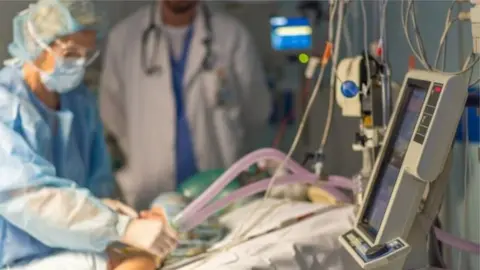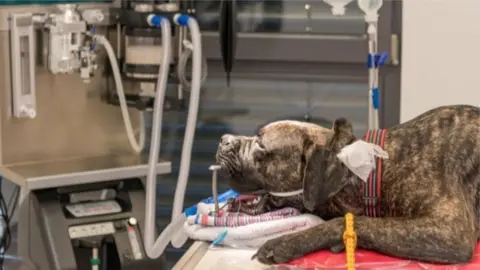Coronavirus: Vets 'could help in hospital' if situation worsens
 Getty Images
Getty ImagesVets could help out in hospital intensive care units if the coronavirus crisis worsens, an executive minister has said.
Agriculture Minister Edwin Poots said staff were on standby if required.
He told a Stormont committee that they could be used to alleviate staffing pressures and help with some clinical roles.
His department has made 20 ventilator machines available to health colleagues if needed.
This is in an attempt to increase intensive care capacity.
"One of the things our department can offer if this crisis is bad enough is the assistance of our veterinarians in hospitals.
 Getty Images
Getty Images"If there's additional pressures put on there and we have got the ventilation equipment and there's staffing problems in the hospitals then that can be provided," he told the assembly's Ad Hoc Covid-19 Response Committee.
It is believed vets could help with things like monitoring patients who are under anaesthetic.
Some departmental vets, who are experts in disease control, could help the Public Health Agency when it comes to community testing and establishing patterns of disease incidence.
A Department of Agriculture (DAERA) spokesperson said: "The department has offered assistance to the Public Health Agency NI and is exploring the potential for DAERA veterinary staff to support the health service in a number of ways.
"We want to do all we possibly can to help."
'Contingency measure'
Some vets have been placed on furlough by private practice and it is thought they might be in a position to help in hospitals.
The department has also done an audit of equipment in private practices to see what might be useful in an emergency.
It is understood ventilators used in veterinary practices are the same as those used in hospitals with only minor adjustments.
It includes anaesthesia and monitoring equipment and machines to generate oxygen.
It has been detailed on a register to be offered to the health service if needed.
One vet said if they were involved it would most likely be at the level of "physician associate" working to complement the roles of doctors and nurses.
The Agriculture department also said that a lab in one of its non-departmental bodies will help with the testing of health service staff to establish if they have the virus.
The facility at the Agri-Food and Biosciences Institute will be able to deliver up to 1,000 test results a day at peak.
Vets a resource
Northern Ireland's Chief Veterinary Officer Robert Huey said vets used to ventilating animals could use those same skills to monitor the wellbeing of human patients.
"Vets are very good at decision making and very good at thinking on their feet. They are well able to understand the needs of a medical practitioner and to implement whatever they ask them to do," he told BBC NI's Good Morning Ulster.
"In the Department of Agriculture we're well used to dealing with outbreaks of viral disease.
"Unfortunately we're too used to dealing with it, so we know about emergency planning, we know about epidemiology and we're talking to the Public Health Agency about how my staff could help.
"We have world-renowned veterinary virologists in Northern Ireland who are literally sitting at home at the moment and it's a resource that Northern Ireland should and can use."